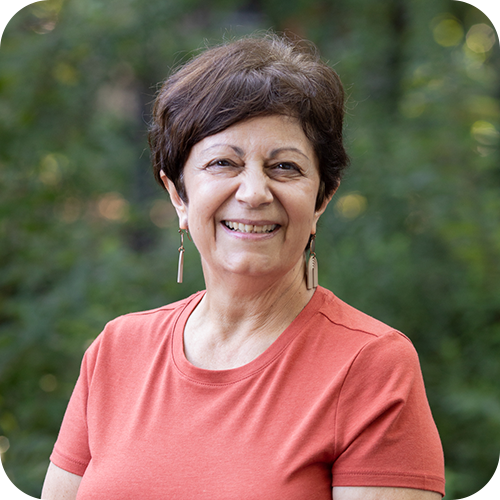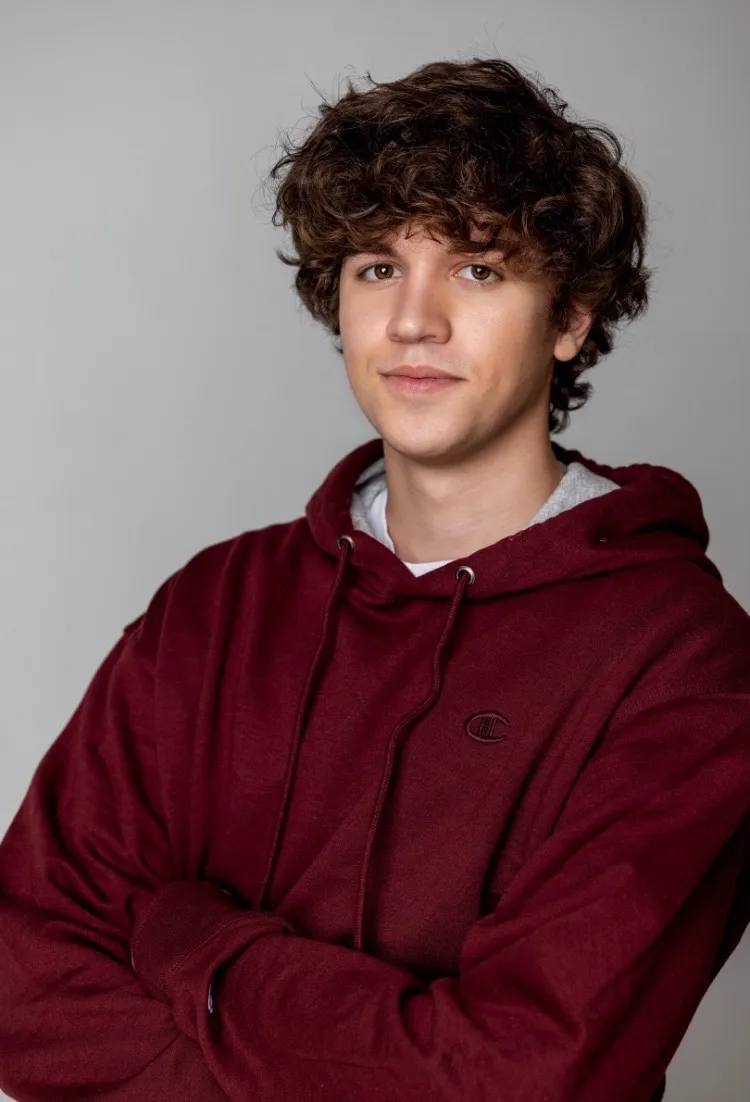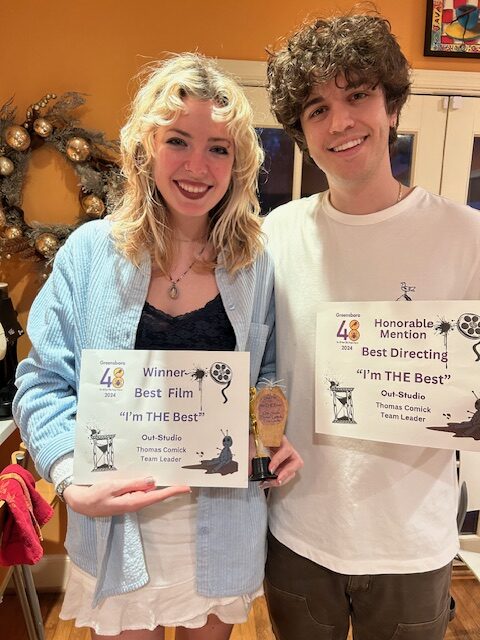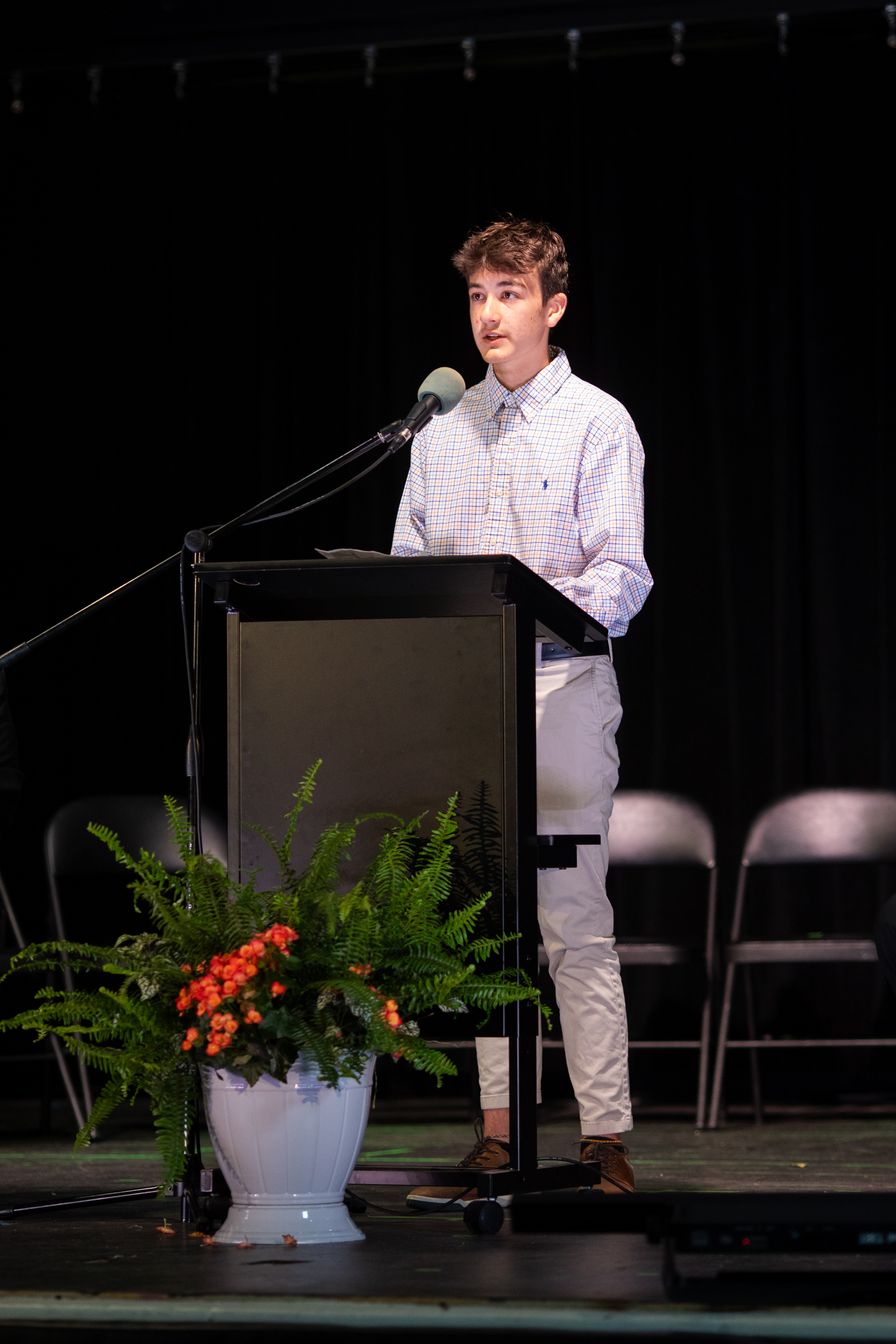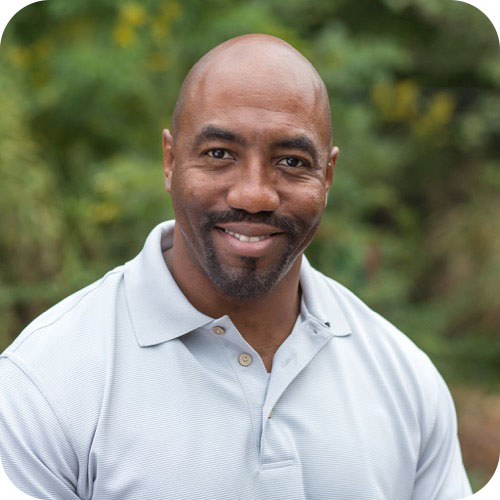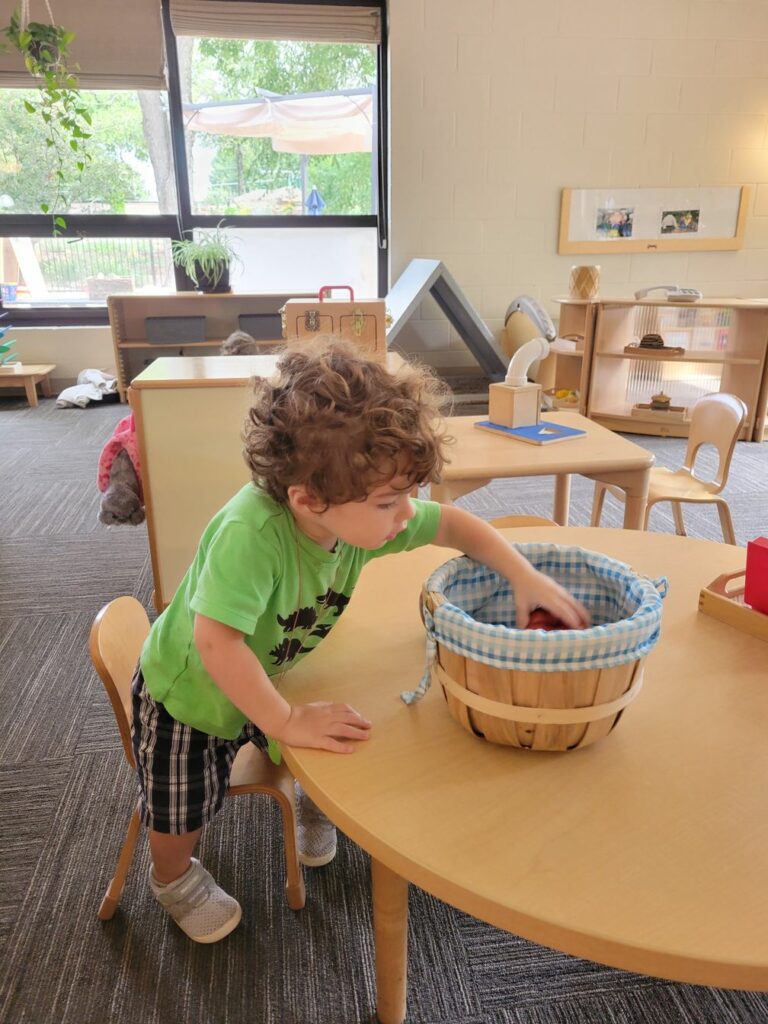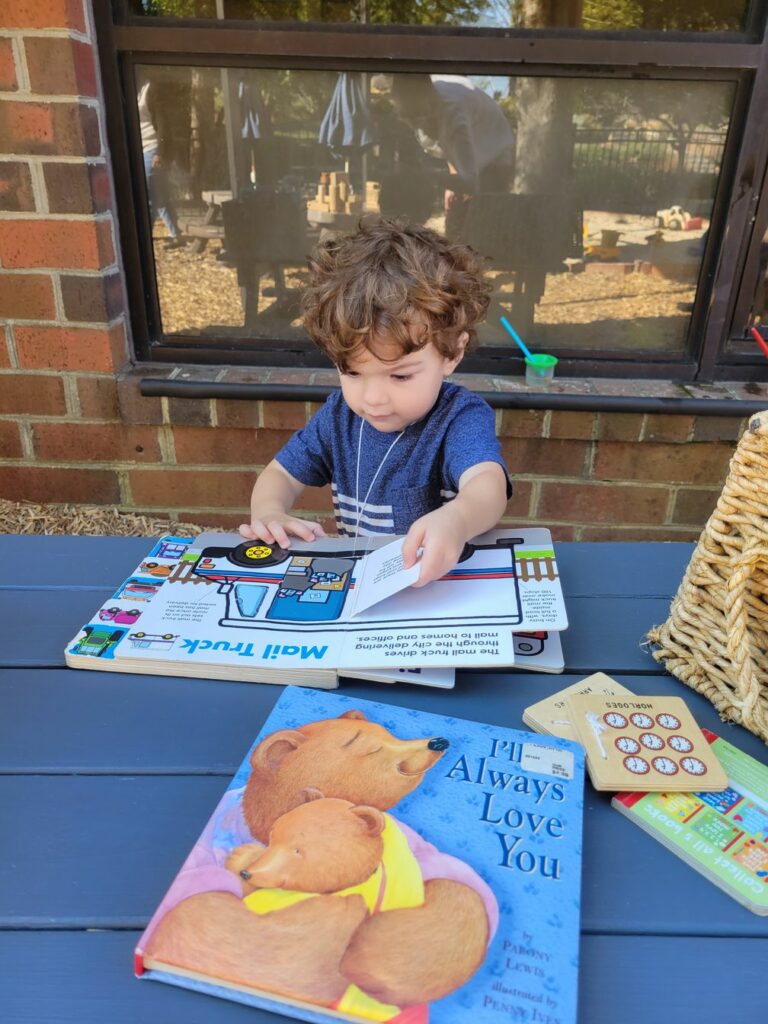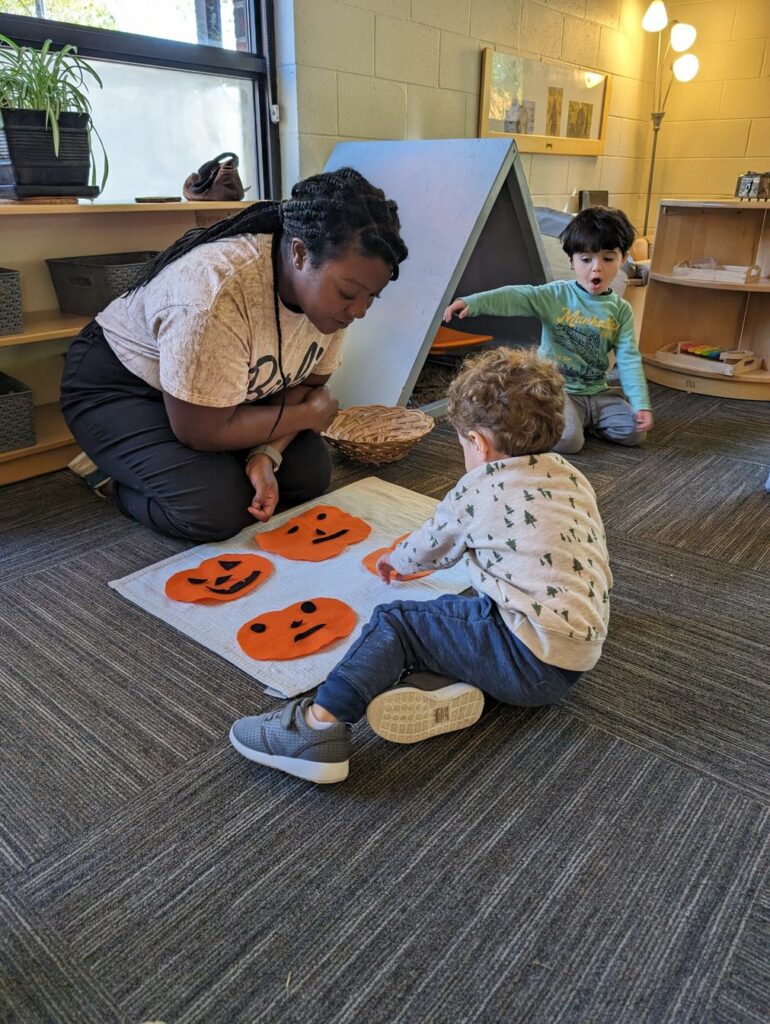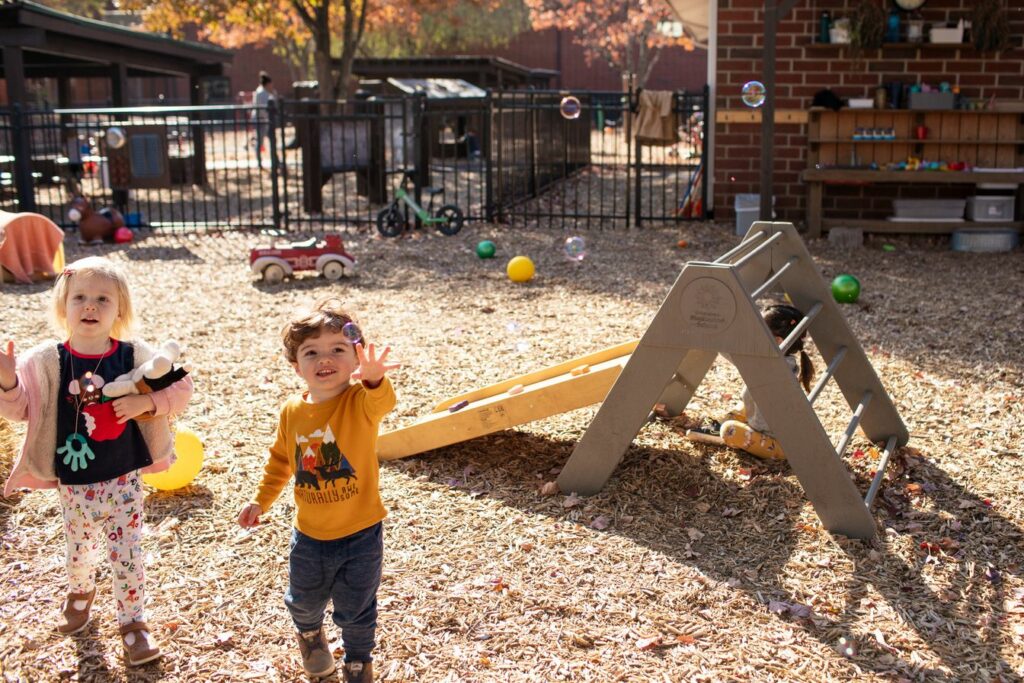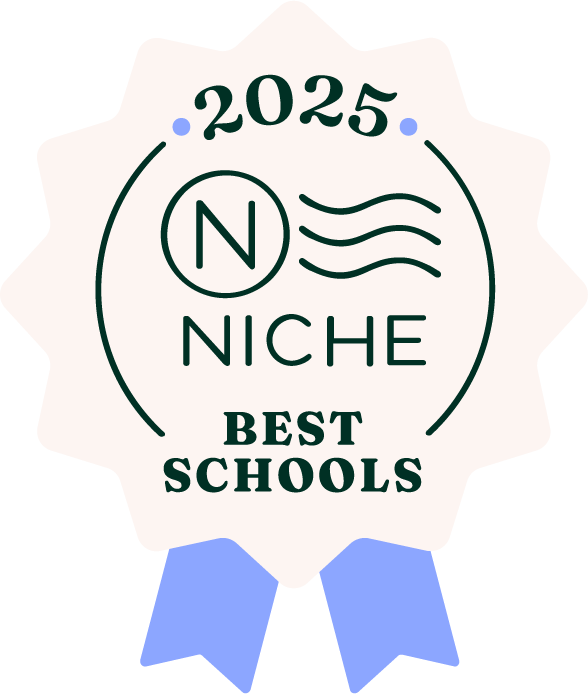You may have noticed an unusual orange fruit popping up everywhere on campus. You may even have asked, "what is that?"
Originally from Asia, and morphologically considered a berry, the persimmon is a lovely fruit that matures to a deep orange color in late Autumn. If you’ve ever visited Greensboro Montessori School's Primary Garden, you’ve probably noticed our beloved persimmon tree, planted over 20 years ago by master permaculturalist, Charlie Headington. In the years since, this tree has been lovingly pruned and harvested by our favorite garden coordinator, car line greeter, facilities assistant, and student support pal, Aubrey Cupit.
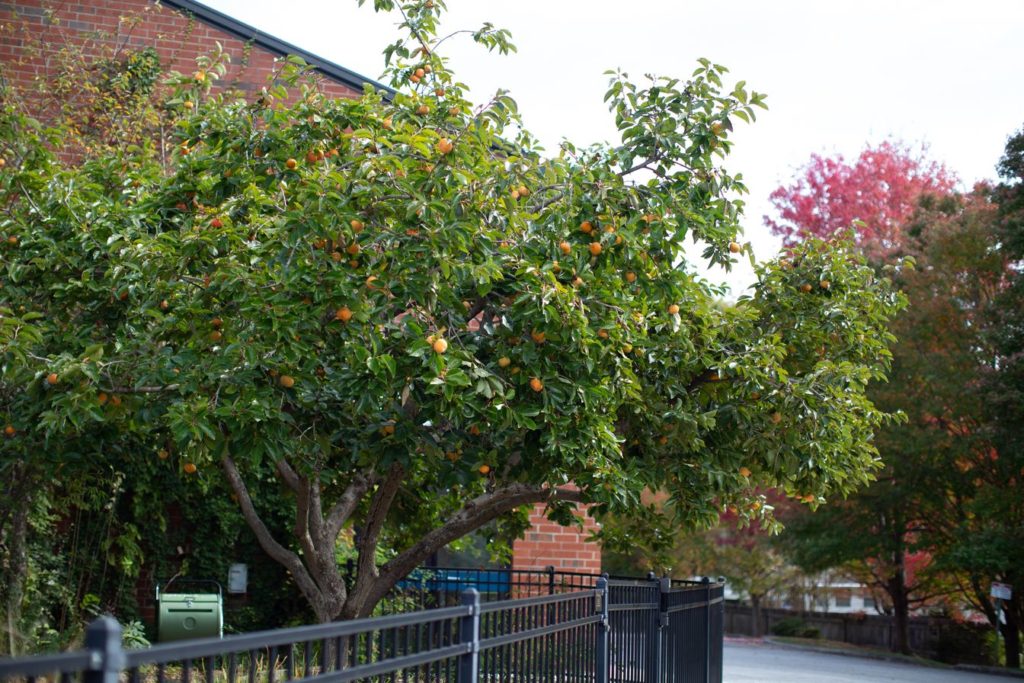
Generations of GMS students share a collective nostalgia for the flavor of the persimmon. To them, it seems a rare, exotic fruit with notes of magic and pure joy only attainable from our grounds. Students begin asking for persimmon snacks in our Environmental Education classes on the very first day of school, and then every subsequent day until we cut into the first ripe persimmon in October. It would be difficult to adequately describe the infectious wave of excitement when our students find out we are having persimmons for snack.
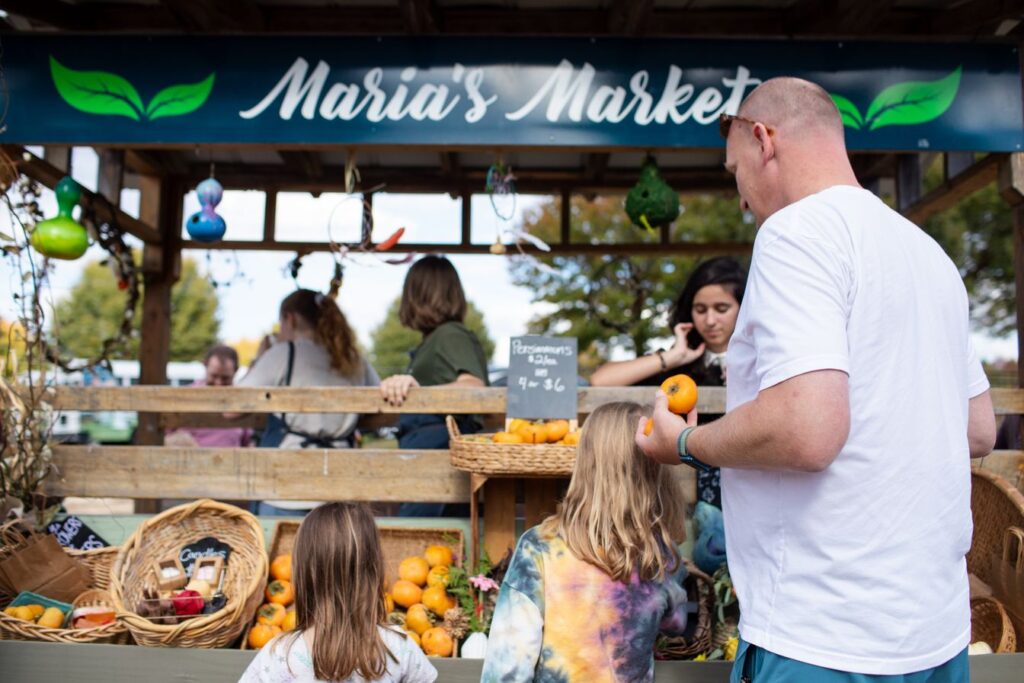
A firm persimmon tastes like a combination of honey, peach, and mango, with earthy undertones and the texture of an apple. For those unfamiliar with this fruit, I would recommend eating it raw, just like an apple, skin and all. Others prefer to bake softer persimmon pulp into pancakes, bread, or cookies. Persimmons work well in savory applications such as persimmon vinaigrette and other meat-based dishes akin to pork and apples. Dehydrated persimmon pulp creates a delicious fruit leather, while dehydrated persimmon slices make an excellent snack.
Each of the five persimmon trees on campus have produced bountiful fruit this season! Our students have reveled in their tastings during Environmental Education lessons and our Junior High Culinary Arts team has been baking with them voraciously! Word on the street is there's a tasty recipe for persimmon scones going around.
Additional Resources
- NPR: Ancient Japanese Food Craft Brings Persimmons To American Palates
- Martha Stewart: 13 Persimmon Recipes Everyone Should Make This Fall
- Wikipedia: Persimmon
Isabelle Bangham joined our School in 1996 as a Primary teacher. She has her Bachelor’s Degree in educational studies from the University of Nice, France and her Montessori teaching credential is in early childhood (ages 2 ½ to 6). Isabelle is originally from Nice and quickly found GMS when she moved to Greensboro.
Isabelle currently works in the Primary 4 classroom with her co-lead teacher, Jackie Shannon. Primary 3 teacher Carmen Romero is also a good friend of Isabelle and has been at GMS for over 30 years.
GMS: How did you first learn about Greensboro Montessori School?
IB: Through a neighbor after my family and I moved back from France to Greensboro, NC.
GMS: Why do you choose to work at our School?
IB: GMS is a very special school where teachers respect their students, and because I believe in Maria Montessori's principles. I have had my two daughters here and they have learned a lot in a safe and wonderful environment who taught them skills that they would not have learned elsewhere.
GMS: What excites you most about working in the Primary division?
IB: I love the fact that each day is a new day and that we can start all over again to help our students the best we can! I also love creating an environment where my students feel loved and appreciated, where they can enjoy learning and have fun!
GMS: What aspect of the Montessori method inspires you the most?
IB: "Following the child", also being respectful and trusting the child.
GMS: What do you enjoy learning from our students, and what do you enjoy sharing with them?
IB: I enjoy seeing their beautiful smiles, their love of learning, their curiosity, and their spirits. I enjoy learning from them their learning style, the way they see others and life, but above all, I love their enthusiasm for everything that they discover and explore every day! I enjoy sharing my gratitude for life, wisdom, kindness, embracing differences, the ability to accept people who are different, empathy, compassion, appreciation of beautiful things, love of traveling, and the French language.
GMS: Is there anyone in your family or close circle of friends that you'd like to tell us about? If so, who?
IB: Yes, my good friend Carmen Romero is a Primary teacher and works next door! I worked with her at the beginning of my career at GMS and we are very close. She was also my children's Primary teacher. Our oldest daughters are very good friends and now have children who are about the same age, so they do a lot of things together! It makes us very happy to know that they are doing life together as parents and can help each other! I have been part of GMS for almost 30 years (and counting), so I know a lot of staff and teachers here. I am blessed to be part of this wonderful community of teachers and students, and I feel good to be a part of this big family!
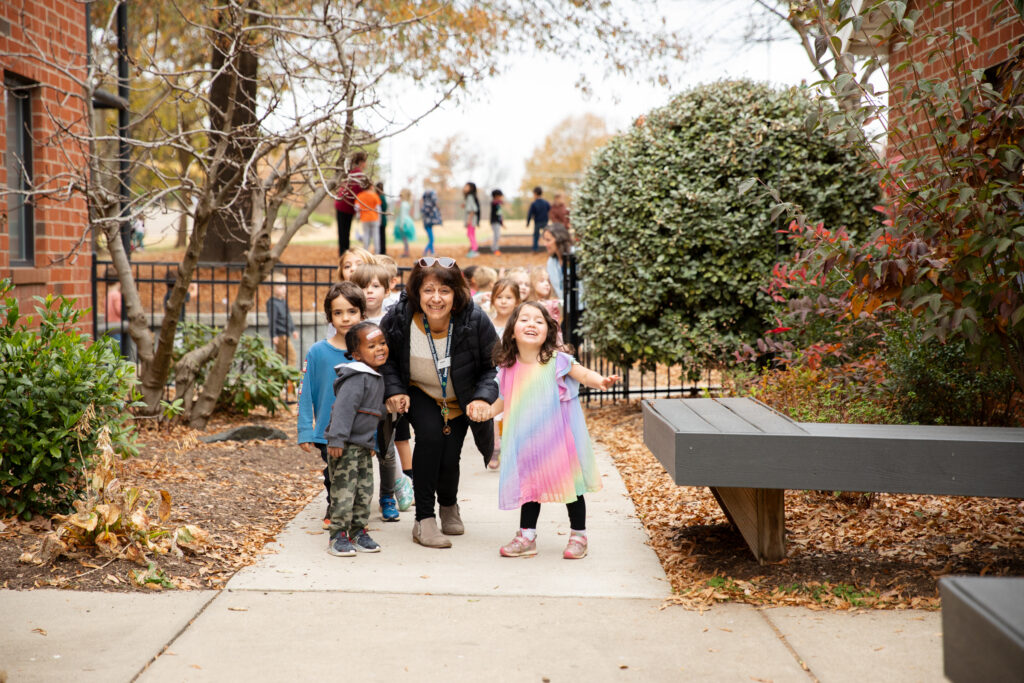
GMS: Tell us something about yourself that we wouldn’t learn from your résumé or CV?
IB: Nine years ago I became a grandmother of a sweet little baby girl, and five years ago, another angel came along, so I feel very blessed and my heart is very happy to be able to spend time with them and teach them everything that I know! When times are rough, they are always there to remind my husband and I that we have so much to look forward to and so much love to give every day! They are the apples of my eyes!
GMS: Where did you grow up, and do you mind sharing one favorite memory from childhood?
IB: I grew up in Nice on the French Riviera in the South of France. I have fond memories of the beach and different places where my brother and I went with our parents. One of my favorite childhood memories is going to Spain (Eastern part of Spain) with my family. We used to leave in the afternoon and my brother and I would sleep in the car. We would get there late at night, but everything was open and we loved going to eat at the "Bodegas"! We would stay in nice hotels and it was just great! Both of my parents have Spanish origins! My great grand-father was from the island of Mallorca.
GMS: What hobbies do you enjoy outside of work?
IB: I enjoy practicing yoga in class, swimming in the summer with my grand-daughters, going on walks, gardening and cooking when I have the time! I also love organizing parties! In the winter, I like to have Tea at the O'Henry in Greensboro!
GMS: What is your favorite indulgence?
IB: I love chocolate, crepes, french pastries. I love traveling! I also love flowers!
GMS: What is something you don’t get to do often but it still feeds your soul?
IB: Having a facial, or a massage, but the first one is definitely so relaxing and good for my soul!
GMS: Other than Dr. Maria Montessori, who would you like to meet from history and why?
IB: I have always loved and respected Maya Angelou as a poet, writer, actress, director, producer, and Professor and I had the pleasure to see her at one of our AMS conferences in NYC years ago! I love her words of wisdom and quotes.
GMS: Is there anything else you would like to share with us?
IB: I miss my family in France and wish they were closer! I wish it was not so far away! I also enjoy living here in the U.S.A and wish I could have both worlds! I have many blessings in my life including my husband of almost 43 years, and my daughters, son-in-laws, and my lovely grand-daughters!
Cindy Webb is a familiar face at GMS and is about to become even more hands-on in the world of Montessori education. She has been a room parent for eight years and is now officially stepping into her new role as lead coordinator of the Greensboro Montessori School Community Association (GMSCA).
GMSCA has dialed back in the past few years due to the effects of the COVID-19 Pandemic, but Cindy’s mission is to make the organization even stronger than it was before. At a school where meaningful relationships and involvement are integral, her goal is to create a deeper connection between children, parents, and teachers. She has a long history with Montessori and is excited to bring her expertise to the table.
“My husband, Daniel, and I began our search for a school when our son Isaac was 2 years old. Some of our friends always spoke so highly of their children’s Montessori learning experiences, which led me to inquire at GMS. Once we toured the Toddler and Primary classrooms, I knew this was the place where I wanted him to grow. I saw how Montessori’s multisensory approach to learning could build a deeper level of knowledge and awareness than is offered at most schools. The beautiful outdoors spaces (such as the gardens, playgrounds, and woods) really resonated with our family as important learning spaces as well.
Our son Isaac entered Primary in 2016 when he was three years old. He has completed three divisions here and is now a seventh grader in Junior High. Observing typical days in Primary and Lower Elementary allowed me to fully appreciate the expertise of the teachers not only in curriculum, but also in childhood development and management skills. Lower Elementary is where I saw the spark develop for our son to follow his intellectual interests. While those interests have changed over the years, immersing himself in learning about a current focus remains strong. It’s a trait that I envision serving him well throughout his life.”
GMS dedicates children to a life of learning and connecting with the world around them. The Webb family felt these values outside of the classroom and easily connected with the GMS community.
“Conversing with fellow parents about learning experiences across the different divisions, particularly about what to expect in the upcoming years, has been meaningful for us as we have reflected back for others and also looked ahead for ourselves. We also have appreciated the many community events that GMS coordinates for families to come together on and off campus like Curriculum Night, the Fall Festival, and Spirit Night at the Grasshoppers game. Visiting with familiar faces and touching base with new families is the spirit of the GMS community.
One common aspect that I see among the GMS faculty and staff is how dedicated they are to each family and to the role they have in nurturing relationships here. There are over 250 students and even more family members that faculty and staff encounter on campus, from the front desk, to carline, to a large event such as the Fall Festival. They somehow recall every name and make personal connections with us all. That level of engagement with families is impressive. Teachers and staff at GMS love their jobs and know the value of their work. Having a teacher that truly knows your child — how they think, how they learn, and how they interact — is quite special.”
Throughout her time at GMS, she looks back on helping teachers as a room parent fondly. Another mission of hers in her new leadership position is to find ways to show more appreciation towards teachers.
“Time spent with teachers in each division helped me to know them as individuals of shared values and concerns and also to appreciate their influence on students. The work that I have done to support our teachers has allowed them to focus more of their time on the critical work they perform in the classroom and after hours.”
In the past, she created the idea of teacher-affirmation boxes that could be filled with notes from parents and students. Cindy states that having these simple gratifications not only represent GMS values, but also allows those in the home and at school to nurture each other.
She only wants to continue and improve this work in GMSCA.
“Working toward creating meaningful connections and increasing involvement among GMS families is a large priority for this year. One idea I am most excited about is building an active parent education community. We all know how challenging parenting can be, especially when we care so much about understanding what is best for our child’s future. I would like to bring together parents that want to learn mindful approaches for home that support the foundations our children gain here at GMS. A few ideas I am working to develop are a parenting book club or discussion group and also follow-up discussions to the virtual ISACS Parenting Series that GMS will offer again this year.”
Lastly, she has some hopes and dreams as a leadership coordinator. Just like every parent here at GMS, she sees a future for her child and for the village that helps him grow.
“The GMSCA hopes to bring together families in a variety of gatherings on and off campus this year. Many of us build connections with fellow parents centered around the friendships of our children. My hope is for the GMSCA to build relationships across GMS that extend further into our shared interests. One way we intend to do this is through establishing several committees of engaged parents to facilitate connections and support across a variety of school activities and initiatives. The GMSCA has the potential to create so many meaningful connections with faculty, staff, and families that could enhance school experiences and also further enrich our lives. I want all parents to participate in a sense of belonging and purpose at GMS. We hope that you all will join us in the opportunities to come.”
Cindy and her husband Daniel, along with their son, Isaac, are beloved members of GMS and the Montessori community as a whole. Her work as a room parent has already shown her commitment to her community and how she embraces every aspect of it. Keep an eye out for any communications from Cindy in the near future as she embarks on her hopes and dreams for the GMSCA.
Thomas Comick '19 is a sophomore pursuing a Bachelor of Fine Arts in filmmaking at the University of North Carolina School of the Arts. "I'm The Best," a short film directed by Thomas and Amelia Waldeck, recently won Best Overall Film at Greensboro's 48-Hour Film Festival. They were also awarded Best Actress, Best SFX, and Best Creature, and an Honorable Mention for Best Directing. Thomas and Amelia will travel to Seattle this month to screen their film at Filmapalooza, the international film festival and filmmaking conference of the 48 Hour Film Project. If they win in Seattle, "I'm The Best" will be showcased in the "Short Film Corner" at the 78th Cannes Film Festival in May.
Thomas graciously agreed to chatting with us following his success at the 48-hour film festival. In preparation for our time with him, we visited his professional website to learn more about his work and passion. This paragraph stood out to us:
"My goal is to use my talents to create meaningful and thought-provoking work that can educate and enlighten audiences, ultimately leading to a better understanding and acceptance of our shared humanity and culture. I want to make works that can grow and I believe that cinema, in particular, has the ability to touch people on a personal level and evoke empathy and understanding. Through my work, I aim to create a space for dialogue and reflection, encouraging people to question their own beliefs and see the world from a different point of view. I hope to create work that is marking to the audience, and leaves them thinking and dissecting what they have seen."
Thomas, who began his Montessori education as a Toddler, met with us for 30 minutes via FaceTime on Monday, February 10, 2025, the morning after Superbowl LIX. Here's our interview, which has been edited for length and clarity.
GMS: Congratulations on your success at the 48 Hour Film Horror Project, and thanks for taking time to catch up with us. Before we get started as a filmmaker, were there any Superbowl ads you liked last night?
TC: I liked the Nike ad. It stood out to me. Nike always does something interesting with their ads because they have so much money and resources to make something really crazy. I liked that it was black and white and featured a lot of different female athletes. I thought it was really cool that they did that. I really liked the “When Harry Met Sally” one. We had just watched the movie the night before, so it was funny to see that.
GMS: Your "About Me" page is amazing. Are the references to Costa Rica and film camp your eighth grade trip to Costa Rica and summer camp at GMS, respectively?
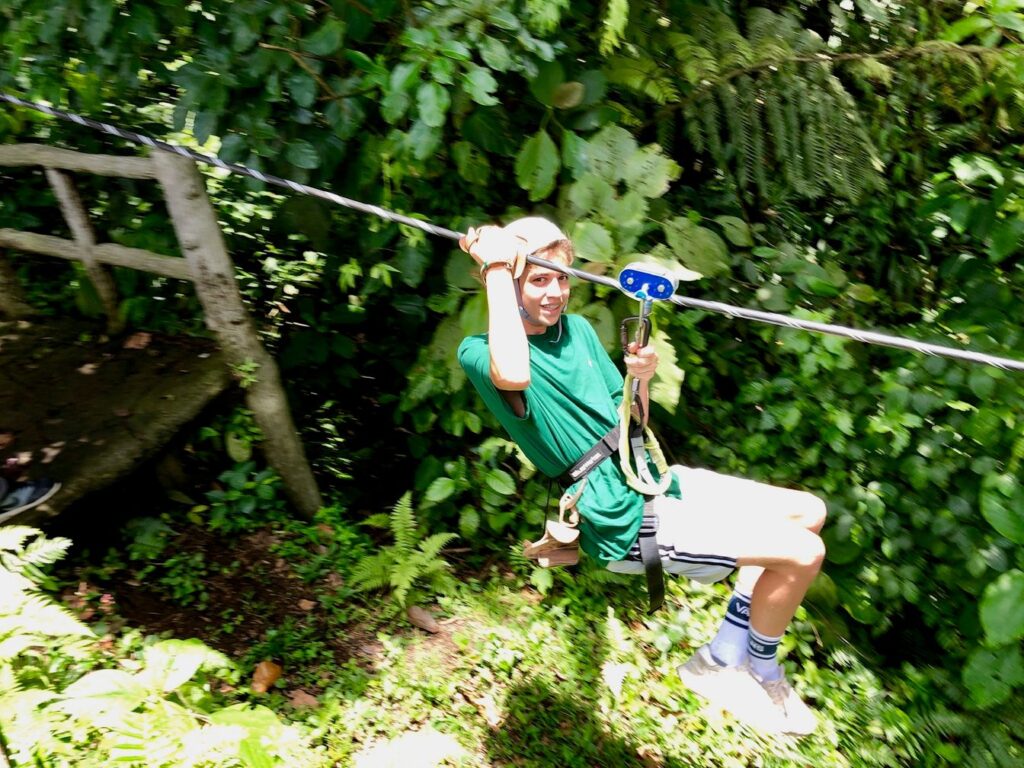
TC: Yes they are those GMS experiences. And thank you so much. I worked hard on that page.
GMS: It’s written beautifully, and your hard work shows. How did the film camp with then faculty member, Jonathan McLean, prepare you for your work today?
TC: The film camps I did over the summer really taught me everything film related. Each summer we wrote the film, shot it, edited it, and premiered it within a month. It was jam-packed. It was stressful but really, really fun. It was a huge learning experience that has stayed with me.
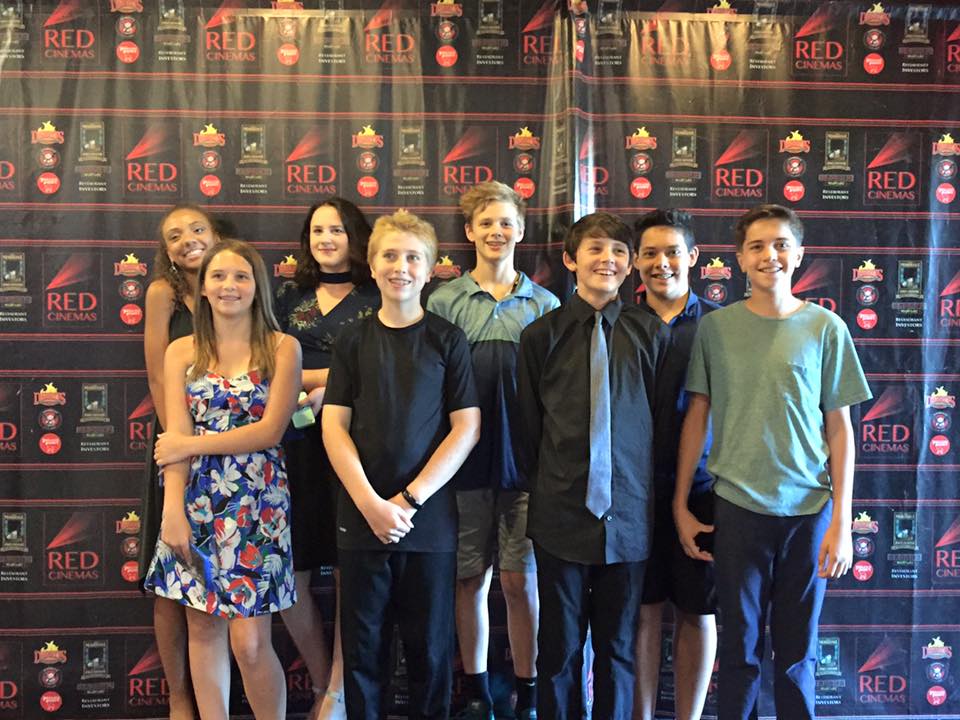
GMS: In addition to what you learned during film camp at GMS, what other elements of your Montessori education help you in your filmmaking?
TC: Working well with others, because it’s all about community and doing things for other people. There are so many events when you’re all together. The social aspect teaches you to interact with other people. In the classroom, the peace table helps you learn how to talk to people face to face when a problem arises. If you’re on set and something goes wrong, it’s good to talk to someone, address it, and move forward, instead of brushing it under the rug or holding resentment.
GMS: Who were your favorite GMS teachers?
TC: Cathy Moses, Doug Williams, Jonathan McLean, Cynthia Kiddy, and Isabelle Bangham. John Archambault, too. He’s a good teacher.
GMS: What were some of your favorite GMS traditions?
TC: I loved going on field trips every year. It kinda sucks when you go to high school and college and it’s done. I don’t know if they still do this, but on Friday’s we did careers. I loved that. It was great.
GMS: Yes, the Junior High students still enjoy participating in various careers each Friday as part of their microeconomy work. What did you like in particular about your microeconomy careers?
TC: I really loved being able to try out different jobs, like finance. My favorite thing was being in the kitchen. I loved cooking. Matt was the the Culinary Arts teachers when I was in seventh grade. He was a really good teacher, and he taught me a lot about cooking. I still cook a lot to this day.
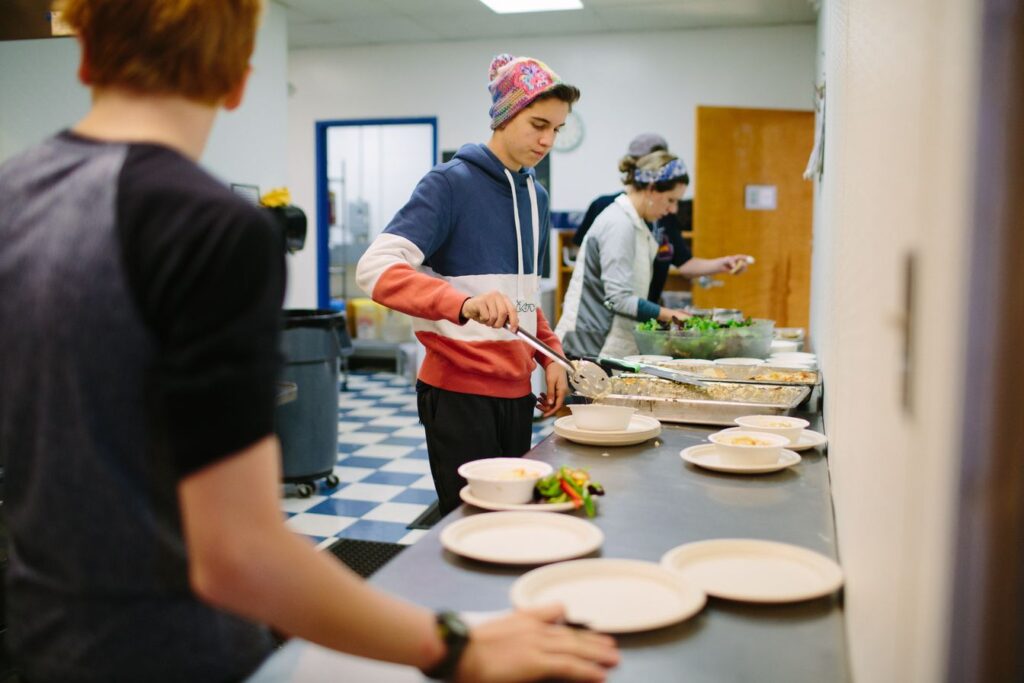
GMS: The Culinary Arts team is still learning and cooking. They have recently begun preparing food for school events and trying new events, like a morning drive-thru selling coffee and baked goods during drop-off. What advice to you have to the Culinary Arts team and all our current students?
TC: Try to engage in as much as possible and follow your interests. Learn as much as you can while you’re there and the people are really nurturing. Even if you’re not great at something, people will still encourage you and make you feel good about it. For instance, if you’re interested in sports, just play. There are no tryouts or anything. They know students are playing different sports for the first time, and the adults work with you. They give you time to play. It is not a toxic environment where people make fun of you if you're bad. It's really the opposite.
GMS: What's a fun fact about you unrelated to GMS?
TC: I speak French. I also flew a plane once. I was with a friend from GMS and we were doing a video for class in middle school. His grandfather had this little plane. We were shooting some stuff, and then we went up in the plane. He let me fly it for a second.
GMS: It seems like film has always led to new experiences for you. What are other experiences filmmaking has given you that you would not have had otherwise?
TC: Being able to act with Zooey Deschanel over the summer. I started doing acting class after having done film camp. I wasn’t happy with how I was acting. Through acting class I ended up getting an agent, so I have been able to audition for a bunch of stuff. I still audition for stuff to this day.
GMS: That's so cool. Most of us probably know Ms. Deschanel from her role as Jovie in "Elf" or Jess Day in "New Girl." Acting with her is an accomplishment, no doubt. What are some other accomplishments you've had since graduating from GMS?
TC: Amelia and I participated in another 48-hour film festival movie last summer and won the audience award. That one was really fun.
I also took an experiential films class and a directing class in the same semester. I was doing a video every week for one of those classes. I did this "Dream Scene" short film for my first directing class, and it ended up winning UNCSA's Ambrosia Film Festival. For a month following the festival, my "Dream Scene" was screened before every showing of the feature film "Problemista" at a/perture cinema in Winston-Salem.
I am also proud of getting all As in high school, which was a goal I set from the beginning. Making all A's, especially as an International Baccalaureate (IB) student, was really hard and a huge achievement. I was also very proud of making the varsity soccer team.
GMS: It's clear your work ethic took you far at Grimsley, where you went to high school, and continues to propel you to success at UNCSA. What does future success look like for you? Where do you see yourself in five to 10 years?
TC: I hope to be living in Los Angeles or New York and directing and writing. I ten years, I hope to have one big, feature film that will have gone to a major festival and help me get established. I hope to have a career – where I can actually be making making money doing it – allowing me to work full-time on just film stuff.
GMS: Thank you so much, Thomas. Good luck in Seattle, and please stay in touch!
When Asher Ermentrout learned about the 2024 Essay Contest for the Fourth Circuit of the U.S. Court of Appeals, he jumped on the opportunity to learn more about a famous U.S. Supreme Court decision and flex his writing skills. As a freshman competing against high schoolers of all ages from five states, he was undeterred.
This year's contest was based on Brown v. Board of Education, 347 U.S. 483 (1954), in which the Supreme Court ruled that racial segregation in public schools violates the United States Constitution. Students were invited to consider and share their thoughts on the question: "Has the decision in Brown, viewed through the lens of 2024, achieved its purpose of ensuring equal opportunity in public education?"
In August, the Fourth Circuit announced the winners of the contest, and Asher came in third place. In addition to the honor itself, Asher won $1,000 and an invitation to the awards ceremony, which was part of the Constitution Day program at the Lewis F. Powell, Jr. U.S. Courthouse in Richmond, Virginia in September.
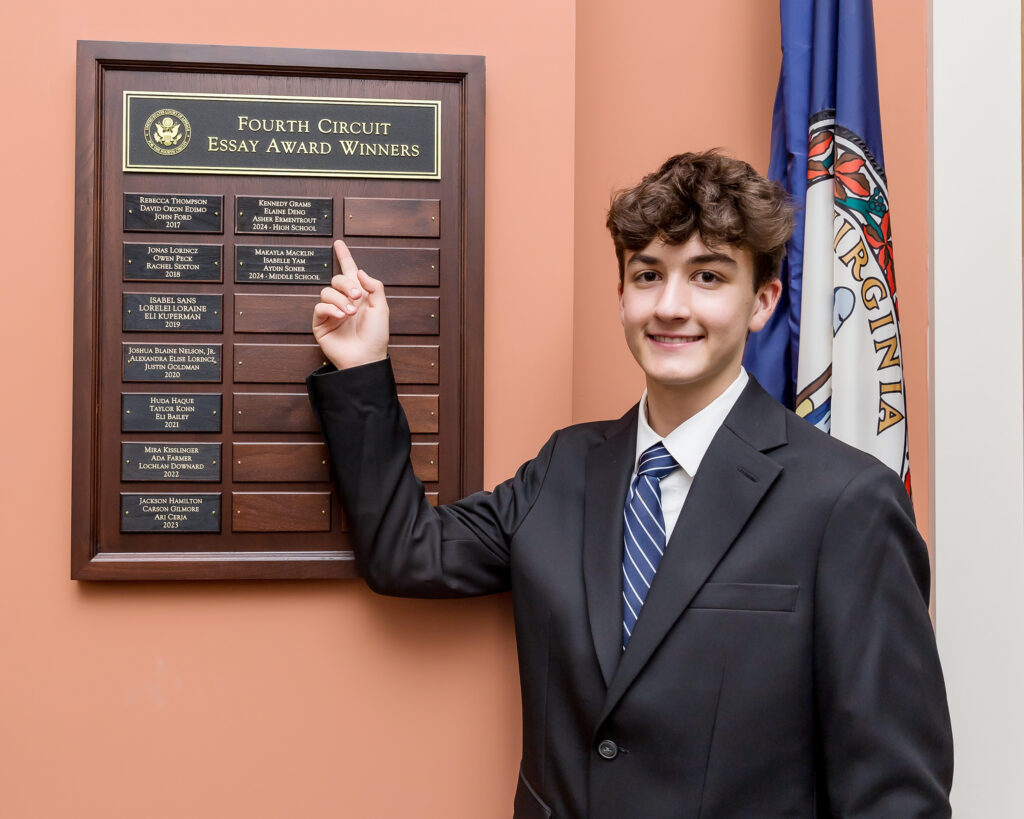
We wanted to congratulate Asher on his award, learn more about his process, and find out what he's up to this year. Here's our interview.
GMS: Asher, congratulations! We love seeing your name on that plaque. How did you learn about the contest and what made you decide to participate?
AE: I learned about the contest through my dad, who is on an email list for the Fourth Circuit Court of Appeals. I chose to participate because I thought it would be fun to learn more about Brown v. Board and spend some of my extra time at school being productive.
GMS: What about the essay prompt, “Has the decision in Brown, viewed through the lens of 2024, achieved its purpose of ensuring equal opportunity in public education?” interested you?
AE: I was interested in researching public education and understanding how cases like Brown can have such significant impacts on society. The prompt provided leeway to explore different aspects of the case’s impact, of which there are many.
GMS: You have experience as a student in both conventional public education and independent Montessori education. How did your Montessori education prepare you to form and share your opinion in your essay?
AE: My Montessori education helped me to think about the prompt from various points of view, incorporating different ideas to form one cohesive piece.
GMS: You wrote your essay as a freshman. (And we have to point out that the first and second place winners were Juniors at the time of writing ... way to go, Asher!) Can you tell us more about your freshman year. Looking back at the year, how did your time at GMS prepare you to succeed in high school?
AE: My time at GMS helped prepare me to succeed in high school by giving me ample opportunities to learn and grow with a supportive community. Additionally, GMS helped me to develop my writing and researching skills that I used to write my essay.
GMS: You're now a sophomore. What classes are you taking, and do you have any goals for the year?
AE: I’m taking Honors English 2, Honors Chemistry, Honors Economics, Honors Spanish 4, AP Precalculus, and AP European History. My goals for sophomore year are to further develop my writing skills and to work more on Spanish.
GMS: Thanks for taking time to chat with us today. We certainly miss seeing you on campus. What is it you miss most about GMS?
DW: The thing I miss most about GMS is the community. The teachers, parents, and students are always there for each other, and it makes for a great environment to learn.
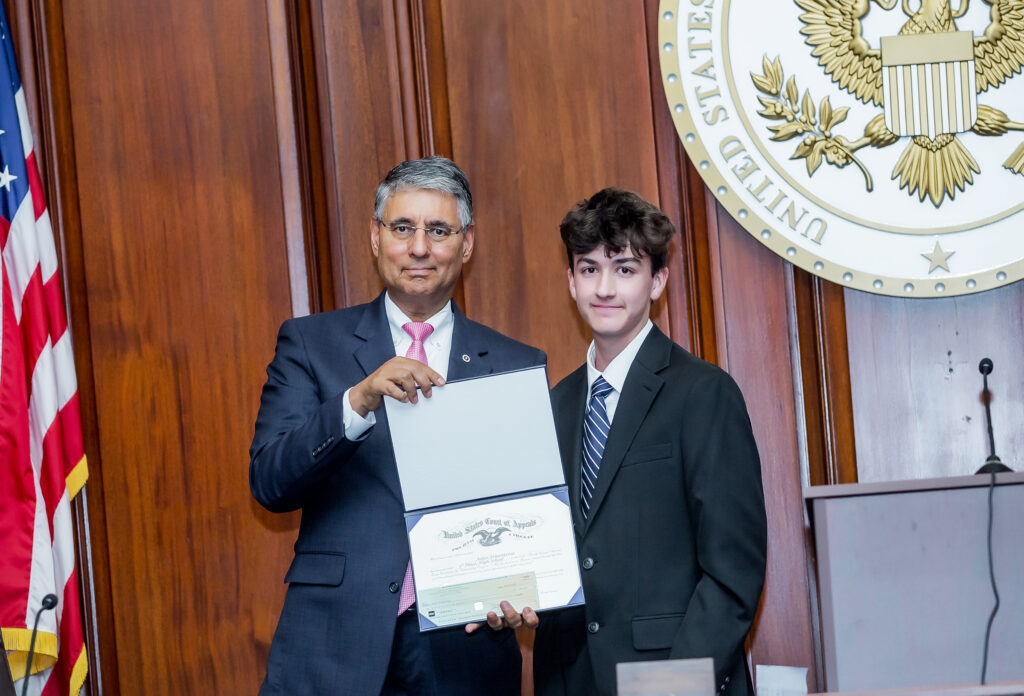
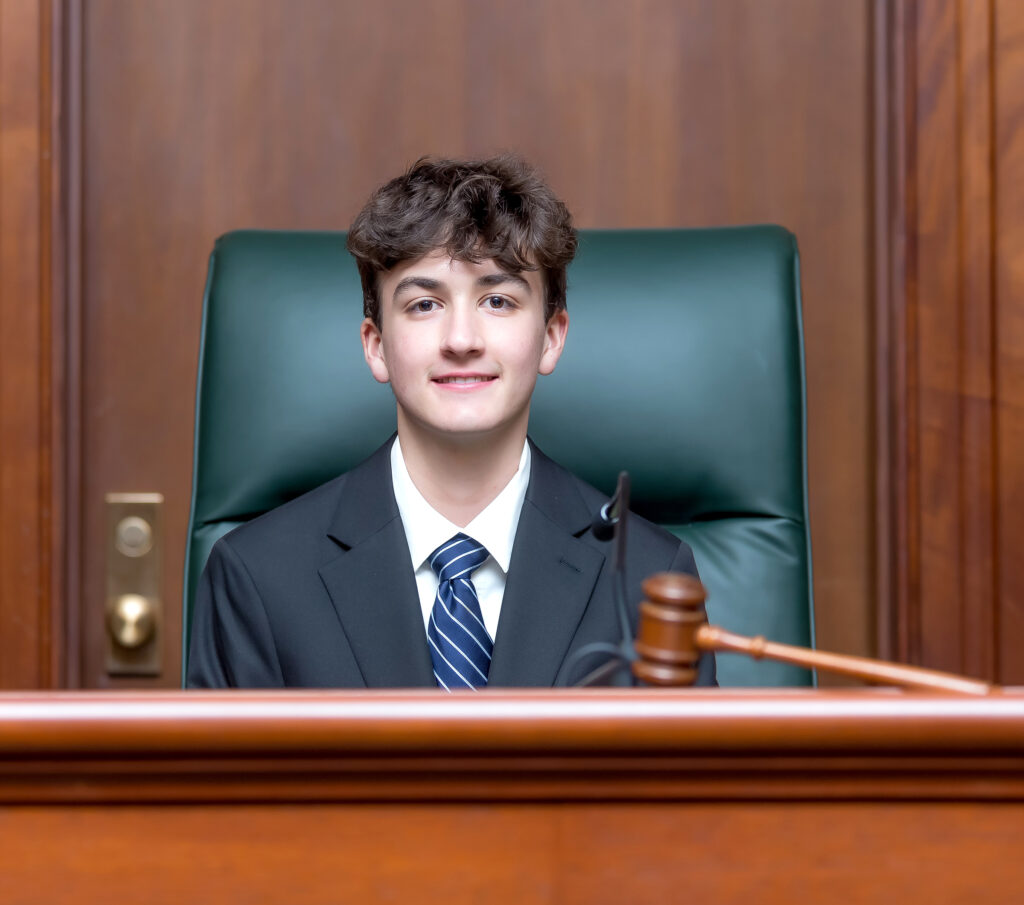
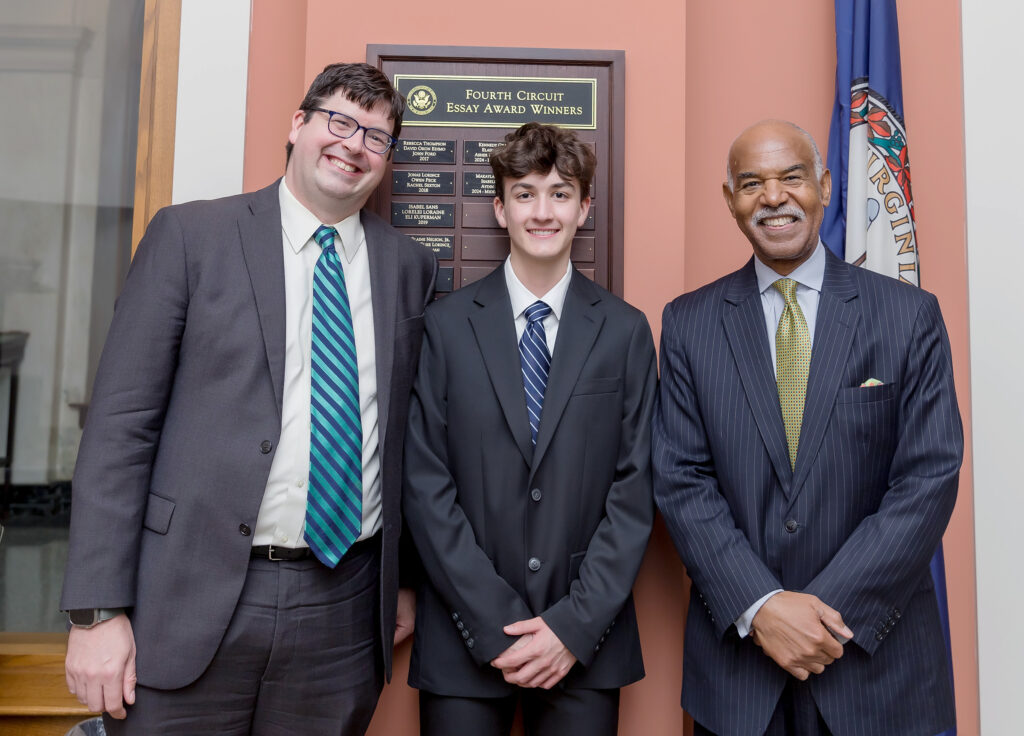
Dr. Maria Montessori was a big fan of field trips. In her words, it was important for students to take “outings” or to “go out.” In 1948, Dr. Montessori wrote: “The outing whose aim is neither purely that of personal hygiene nor that of a practical order, but which makes an experience live, will make the child conscious of realities … When the child goes out, it is the world itself that offers itself to him. Let us take the child out to show him real things instead of making objects which represent ideas and closing them up in cupboards.” Hence, the Montessori phrase of “going out” was born.
At Greensboro Montessori School, we take the Montessori tradition of “going out” to heart, as our students take academically aligned, overnight field trips beginning in Lower Elementary. Where lessons in the classroom are a springboard to learning, Montessori outings provide the experiences necessary to move concepts from the abstract to the concrete – to let students apply and expand their knowledge in the world around them.
As our students progress from Toddler to Junior High, they learn the rites of passage, including the field trips, which will greet them along the way. Read about all our adventures, or jump to the division that interests you most!
Lower Elementary
Beginning in second grade, Lower Elementary students take annual trips to either Earthshine Discovery Center in the Nantahala National Forest in western North Carolina or the Sound to Sea program along the North Carolina’s Crystal Coast. Second and third grade students spend two days and three nights building upon their lessons in biology, botany, environmental studies, geography, history, and physical science.
Upper Elementary
North Carolina's Outer Banks: Fourth graders travel to North Carolina’s Outer Banks where they experience the region’s rich marine biology and storied history. Students visit national landmarks like Roanoke Island, the first settlement of English colonists, and the Wright Brothers National Memorial in Kitty Hawk. In the words of the National Parks Service, Kitty Hawk is the site where Wilbur and Orville Wright “experimented with flight in the early 1900s, and finally succeed[ed] on a cold winter day with the world's first controlled, sustained, powered, heavier-than-air flight.”
Colonial Williamsburg: Fifth graders travel to Colonial Williamsburg, where they immerse themselves in the history of the American Revolution and explore, as Colonial Williamsburg puts it, “the political, cultural, and educational center of what was then the largest, most populous, and most influential of the American colonies. It was here that the fundamental concepts of our republic — responsible leadership, a sense of public service, self-government, and individual liberty — were nurtured under the leadership of patriots such as George Washington, Thomas Jefferson, George Mason, and Peyton Randolph.”
Due to class sizes and travel logistics, fifth and sixth graders will travel together this year, heading to Washington, D.C. Next year, our current fifth graders will enjoy their Williamsburg experience as sixth graders.
Washington, D.C.: Sixth-grade students head to our nation’s capital, where they visit multiple Smithsonian museums, (including the National Museum of African American History and Culture and the National Air and Space Museum), the National Archives, Arlington National Cemetery, and the National Gallery of Art and Sculpture Garden. Students expand upon their knowledge of national government and civics, while practicing grace and courtesy in a metropolitan city center. Dr. Montessori writes: “A child enclosed within limits however vast remains incapable of realizing his full value and will not succeed in adapting himself to the outer world. For him to progress rapidly, his practical and social lives must be intimately blended with his cultural environment.”
Junior High
Seventh and eighth graders rotate between annual field trips to Arizona and Costa Rica every spring.
Arizona: When students head west to Tuscon, Arizona, their years of environmental science studies take center stage during a week-long trip. In addition to hiking Kitt Peak, students spend time at the University of Arizona’s Biosphere 2, a state-of-the-art scientific facility. The mission of Biosphere 2 “is to serve as a center for research, outreach, teaching and life-long learning about Earth, its living systems, and its place in the universe; to catalyze interdisciplinary thinking and understanding about Earth and its future; to be an adaptive tool for Earth education and outreach to industry, government, and the public; and to distill issues related to Earth systems planning and management for use by policymakers, students and the public.”
Costa Rica: When students make their way to San José, Costa Rica, they enjoy an authentic immersion experience that includes living with the Costa Rican families of students from The Summit School, our sister school in Coronado, Costa Rica. Together, our students and the Ticos (a colloquial term for natives of Costa Rica) go everywhere together. They visit volcanoes, complete high ropes courses, and sail through the rainforest canopy on zip lines. They travel to the Caribbean Coast where they walk the beach at night looking for turtle eggs to bury in a nearby protected hatchery. Then, they travel to the Pacific side to snorkel and explore rain forests and animal sanctuaries. They also spend a day in downtown San José learning about Costa Rican history, art, and government. With every visit to Costa Rica, our students return with their eyes a little wider and their lives a little richer as they have their first experience actually living in another culture.
Self-Directed Travel for Ninth Graders: An important element of our ninth-grade curriculum is the completion of a year-long capstone project that challenges each student to apply their skills to an area of personal interest that will improve and enhance their world. Similar to a thesis or senior project, the capstone project provides a framework for demonstrating leadership and advanced application of critical thinking skills. To further extend their learning, the students are challenged to design a custom end-of-year outing to include research opportunities for each of their individual capstone projects. In collaboration with a faculty advisor, a past ninth grade class settled on an itinerary traveling throughout the Pacific Northwest. Their route took them to explore tidal pools, tour museums in Seattle, visit a military base in Tacoma, and interview refugees in Vancouver.
Doug Williams joined our School in 2005 as a member of our Junior High teaching team. He holds a Bachelor of Arts in liberal studies from North Carolina Agricultural and Technical State University and a Montessori teaching credential in Secondary I (12 to 15 years old). Prior to joining GMS, he worked as a full-time mathematics tutor.
Doug partners with Emily Daniels (humanities faculty) and Tim Goetz (science faculty) in our Junior High program guiding students in seventh, eighth, and ninth grades. In addition to teaching mathematics, he guides the financial and eCommerce functions of the Junior High microeconomy.
GMS: How did you learn about Greensboro Montessori School?
DW: I tutored a student whose sister was in eighth grade at GMS. The student's mother informed me that the school was looking for a math teacher. I met with Frank Brainard (former head of school) and the Junior High crew at the time, and came in for a formal interview. The rest is history.
GMS: We appreciate that mother! Word of mouth is our best source of referrals for new faculty and new students. After you visited, what was it about Montessori education that made you choose to work here?
DW: The Montessori philosophy aligns with my belief that education should be student centered. I am also inspired by teachers as guides and the prepared environment. To quote Betsy Coe, "If your instruction is more than seven minutes, you are doing the work for them!"
GMS: It's no surprise that the child-centered approach is what speaks to you ... it's shared core value for most Montessorians. You've been working with adolescent students since your first day at GMS. What excites you most about our seventh, eighth, and ninth graders?
DW: The sassy kids. Middle school ("Junior High" at GMS) is a great age to work with. Kids are learning what it means to be an adult, yet they are still kids.
GMS: What do you enjoy sharing most with your students?
SS: I enjoy giving them independence and letting them learn from the prepared environment and their peers.
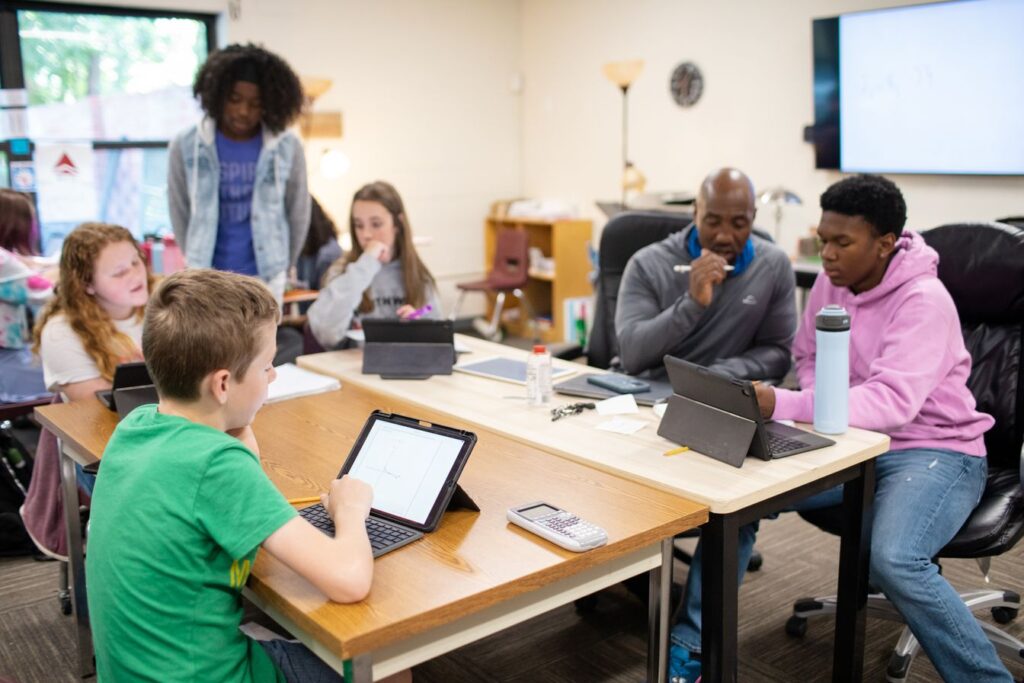
GMS: It's time to get personal. Where did you grow up, and do you mind sharing a favorite memory from childhood?
DW: I grew up in Halifax County, NC in a very small town called Scotland Neck, close to Rocky Mount, NC. My mom has six brothers and five sisters. I enjoyed visiting them as a child. There was always some place to go.
GMS: We know your mom means a lot to you. Is there anything you want to share about her?
DW: My mom is the epitome of sacrifice, selflessness, and love. She was the primary care giver for my grandmother for almost 20 years.
GMS: The apple doesn't fall from the tree. You embody the same qualities; we can't recall a time you've said "no" to any request, job, or favor here on campus. Thank you for your servant leadership. Outside of everything you do for GMS, what do you enjoy doing for yourself?
DW: I hit the gym six days a week. I bowl once a week.
GMS: If your craving a post-workout snack, what do you reach for, salty or sweet?
DW: Both! Kettle corn is my favorite snack.
GMS: What is something you don’t get to do often but it still feeds your soul?
DW: Read books by Orson Scott Card.
GMS: What have we forgotten to ask about, and what would you like to share?
DW: In 2022 I became the resident caretaker at the retreat center (the house) at The Land. The retreat center is a bunk house with four wings. One of those wings is my apartment, with the other three wings featuring bunk rooms for students. In addition to living there, I spend about 10 hours a week caring for the inside of the house and the property immediately surrounding the house. I absolutely love it!
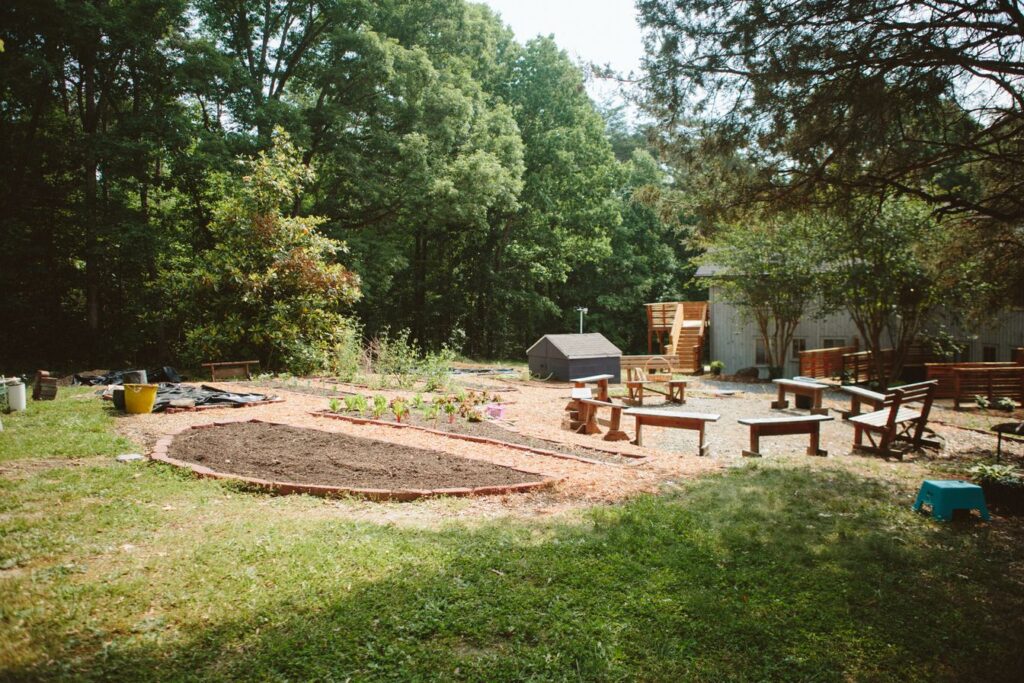
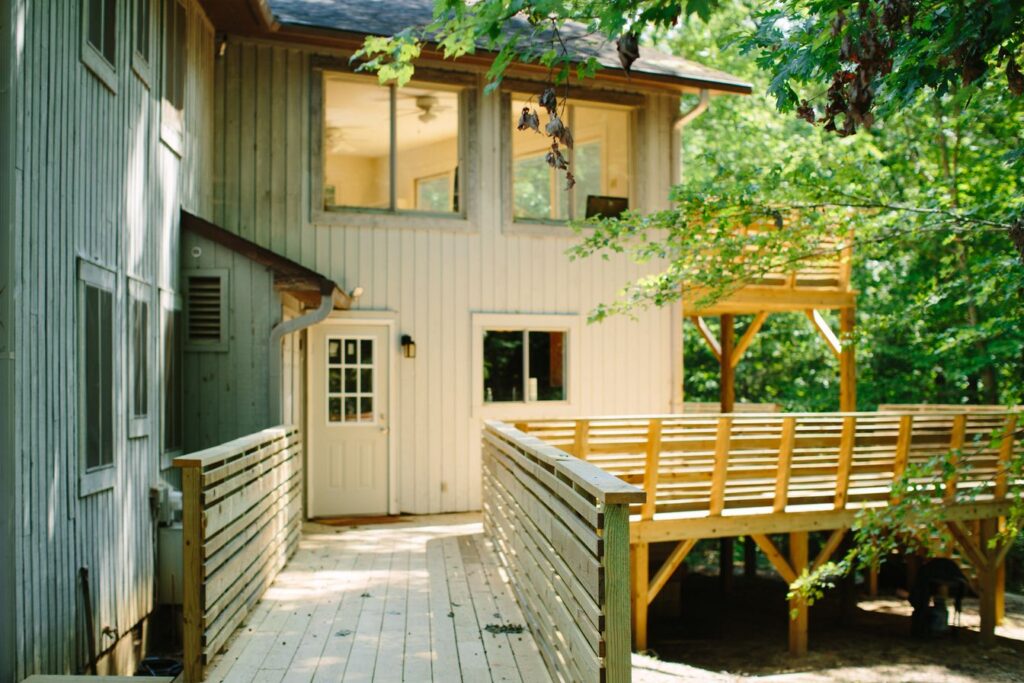

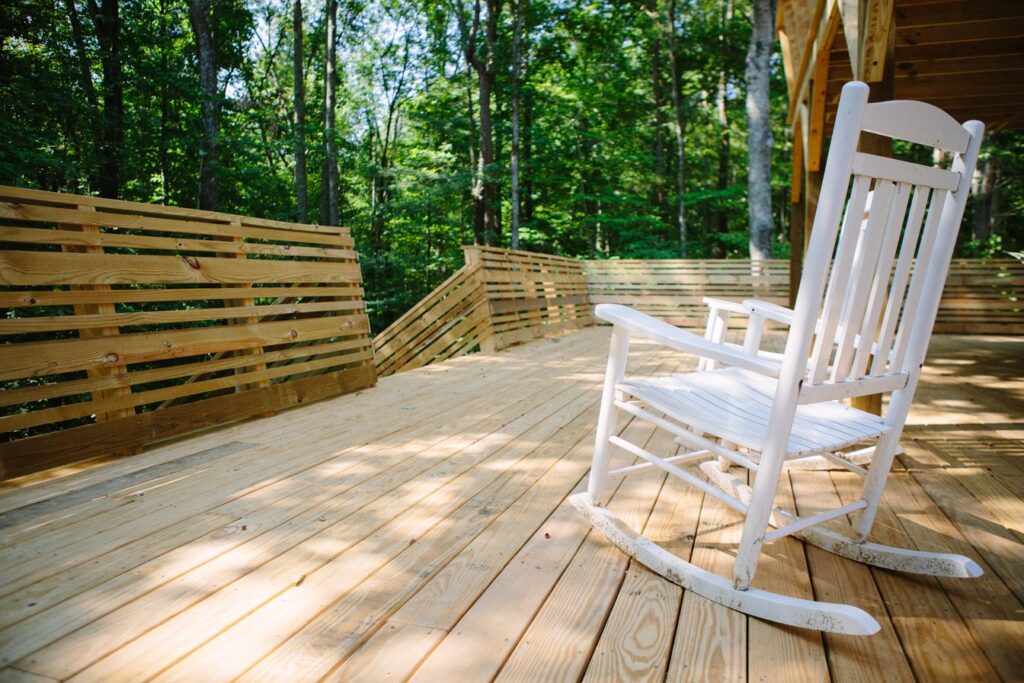
Greensboro Montessori School has been celebrating eighth grade graduations since 1997, when our first class of three eighth graders completed their Montessori journey and excelled into high school. These early graduates are now young professionals with families of their own and many choose to enroll their children at our School. This year we welcomed another legacy alumni family to our School – Michelle Todd and Steven Todd '03. Michelle is a speech language pathologist in Gastonia and Steven is a professional pilot. Their son, Andrew, is a member of our Toddler community.
GMS: Michelle and Steven, thank you for taking time to share more about your family with us. Before we jump in, what can you tell us about yourselves as individuals?
MT: I grew up in a rural area of Indiana with my parents and younger sister. I knew early on I wanted to be in a profession that helped individuals. I attended Purdue University for my undergraduate degree and UNCG for my masters degree. I primarily work with the adult population specializing in stroke/traumatic brain injury, head and neck cancer, and dysphagia within the acute and inpatient rehabilitation settings. Outside of work I love to craft, bake, organize, spend time with our dog (Maisy), and travel.
ST: Thanks to my dad, aviation has always been a love story to me. With all the ups and downs, a love story is about passion, goals, and dreams. And those dreams started young for me!
I remember teachers at GMS helping me learn certain concepts by trying to explain it in aviation terms. Part of my graduation speech included my goal to attend Embry Riddle Aeronautical University. This eventually became a reality. While I originally wanted to fly professionally, I pursued aviation management after heeding the advice of my dad that I should learn every aspect of the aviation industry to truly find my passion.
I started on the ramp loading baggage and cleaning jets at the Greensboro airport for Piedmont Airlines during college. Following graduation, I moved to Phoenix working on the ramp in management. The following year, I secured a position in Charlotte for US Airways (and later American Airlines post-merger) as a customer service manager. I eventually managed AA’s ground operations from the tower. Throughout this time, I still had a desire for flying professionally and pursued completing my flight training. I later moved to Florida where I instructed international students how to fly. This is where I think Montessori helped me the most. I was now sitting where my teachers sat, except it was in an airplane teaching someone how to fly an amazing machine. I found the teaching techniques I remembered from my time at GMS successfully influence how I instructed. Following a year teaching, I moved on to Envoy Air, a Regional Airline for American Airlines flying an Embraer 175 out of Chicago.
Presently, I fly a Boeing 767 for Atlas Air flying Amazon Cargo and US Troops and their families around the world. Along with everything you do in life, the hard work and the passion with which you approach your goals and dreams are everything: from a baggage handler loading and cleaning jets night after night to working one of the coolest jobs I think most children dream about when they look up in the sky. I wholeheartedly believe if it wasn’t for my upbringing in the Montessori environment, it would have been a lot harder to pursue those dreams. A child can truly be or do anything that they can imagine which is what I think Montessori is best at. The passion and the imagination of a child is truly an incredible gift that we all get to take a part in developing and fostering.
GMS: You both have great personal stories. How did these stories come together?
MT: We met during college at a young adult church function. We later learned we actually lived in the same apartment complex one building apart. We ended up dating long distance upon graduation; however, distance certainly made the heart grow fonder. We feel the strong foundation in communication we made has allowed us to continually grow together. We love the beautiful life we are making and can’t wait to see what the future holds.
GMS: We are excited as well and grateful your family has chosen GMS to play a role. Michelle, do you remember when Steven first told you about his time at GMS and the moment when you decided as a family that Montessori was right for your family?
MT: Steven first shared his educational journey during our time while dating. He always expressed such fondness of his experiences with Montessori from approachability and helpfulness of his teachers to his fun learning experiences that helped foster confidence and responsibility.
After getting married and discussing more in depth our goals for future child(ren), we both agreed a strong educational foundation was of upmost importance to us. Knowing Steven’s positive outlook from his time in Montessori, it certainly was in the forefront of our plans. Once Andrew had his first birthday, we knew Montessori schooling would be perfect for our very curious and active little boy to help further nurture his independence.
GMS: Yes, Andrew is so curious and independent. We see it in the classroom every day. Steven, how does it feel returning to GMS as a parent? What’s the same, and what’s different?
ST: I think it’s absolutely incredible to return to GMS as a parent. And it’s wonderful seeing adults sending their kids to GMS that I grew up with as well. I think it’s truly powerful to step back into a classroom that I once worked in helping mentor children as a middle schooler. Even as an adult, I still get the same excitement as when I was a student stepping on campus every day, as well as the strong feelings of being loved and cared for as an individual. On that note, I think it’s extremely important for a child to have those same feelings and the same environment to be able to grow into a wonderful caring person throughout the years, which is why I wanted Andrew to be at GMS. I think it’s the best gift in life we could ever give him. I think it’s absolutely incredible what GMS has become since I graduated in 2003 and very much look forward to seeing Andrew grow in the same atmosphere.
GMS: Thank you, Steven, and welcome home! We're so glad to see you every day and thankful you've introduced us to Michelle, and she is also part of this place. What is it about Montessori that most appeals to you as parents?
MT: It is certainly different from the “traditional” or “standard” model that I grew up with; however, I think I appreciate that the most. Maria Montessori stated, “The goal of early childhood education should be to activate the child’s own natural desire to learn.” I am encouraged to know this learning model focuses on the individual with development of foundational life skills for becoming a successful, independent person. I never want my child to have his curiosity or creativity diminished. I want him to be supported and surrounded in an environment where he doesn’t feel insecure to seek out help with challenges and recognize his capability in doing hard things. I also love the encouragement of fostering his constant desire for movement!
ST: Growing up in Montessori, I absolutely loved school. Maria Montessori quoted, “As we observe children, we see the vitality of their spirit, the maximum effort put forth in all they do, the intuition, attention and focus they bring to all life’s events, and the sheer joy they experience in living.” I think this is a very powerful quote for children when it comes to the learning process. A learning environment should be exactly that. That’s why Montessori really spoke to me as a child and really helped foster my personal learning style ... because every child learns differently, and the Montessori environment in my opinion is the best at that.
GMS: What are your dreams for Andrew as he embarks on his Montessori journey?
MT: I hope to follow Maria Montessori’s statement “The greatest gifts we can give our children are the roots of responsibility and the wings of independence.” During this phase of toddlerhood, I hope he will continue to develop his love of learning by supporting his curious nature. I also think promoting independence will help his self-confidence, perseverance, and initiative. I know these aspects will help develop a strong foundation for skills he will utilize for his lifetime.
GMS: Thank you for your time, your thoughtful words, and your support of Greensboro Montessori School. We love being on this journey with you and Andrew.
Greensboro Montessori School hosted two teacher workdays this fall, each dedicated on professional development. Classrooms were closed giving our team uninterrupted time to focus on learning new skills and growing as educational professionals. So how did the team use their time?
During our September 20 workday, faculty paused to reflect on the work we do with students every day and our approach to guiding them in their meaningful work. Nancy VanWinkle, instructional coach, and Jessica White Winger, director of student support, led a workshop designed to build teachers’ tool sets for preparing the environment, particularly expanding the resources of the prepared teacher. The theme was building a “Community of Reflective Practitioners,” with a focus on leveraging the collective experience of the educators in the room.
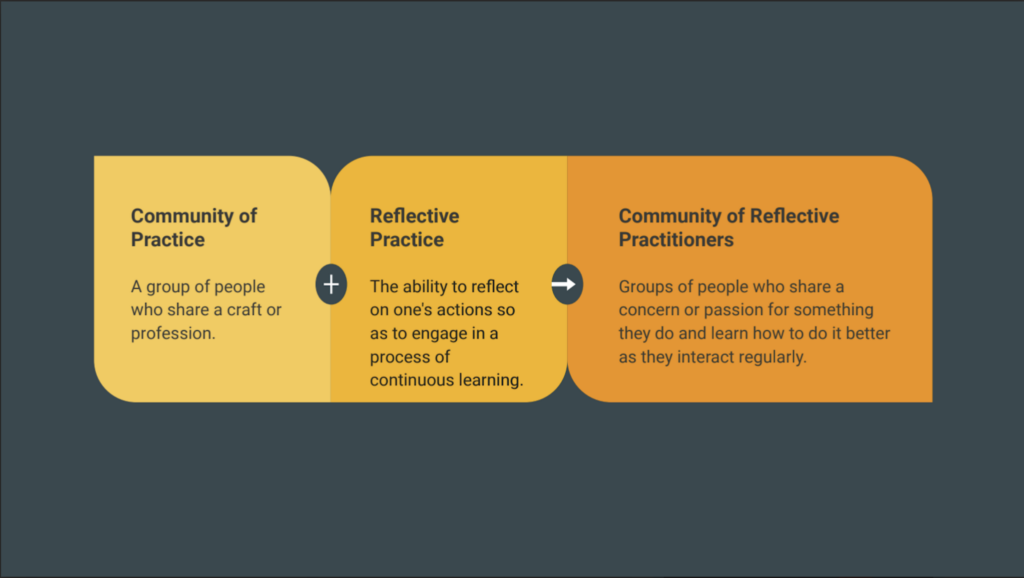
Teachers worked in mixed-division groups, with varying years of experience in the field. The morning opened with a grounding activity in which teachers were shown photographs of individuals who have affected positive change in the world. These individuals have raised awareness around difficult issues, often putting their lives and work at risk to do the “right” thing. Teachers were asked to work with their groups to list the qualities of one of those changemakers. Following a share-out, the group reflected on how we can encourage these qualities in all of our students. This impactful exercise grounded us in the knowledge that each child is under “self construction” and we have the big responsibility of allowing their true light to shine, while helping guide them in becoming their best self.
Following this exercise, Nancy and Jessica shared what resources and experiences they have to support teachers during the 2023-24 school year. As our instructional coach, a role dedicated to support faculty in their professional development, Nancy worked closely with Jessica to design a collaborative problem-solving approach for schoolwide implementation. The model offers teachers a practical tool for seeking input from one another and leveraging the cumulative knowledge of our faculty and staff.
This collaborative problem-solving model has teachers sharing a specific behavior they are experiencing with a child in their classroom. A group of educators, with one facilitator and one recorder, reflects on the overall question, “What’s going on with this child?” and what are the unmet needs, lagging skills, or obstacles that the student might be encountering? By looking at the heart of the issue, we honor the child and seek to better understand what their behavior is telling us. The facilitator then takes the group through a series of brainstorming questions, while the recorder writes strategies and suggestions. In the end, the teacher chooses a strategy to try out for a week and agrees to report back to the group. At that point, they may revisit the brainstorm and select another strategy to try.
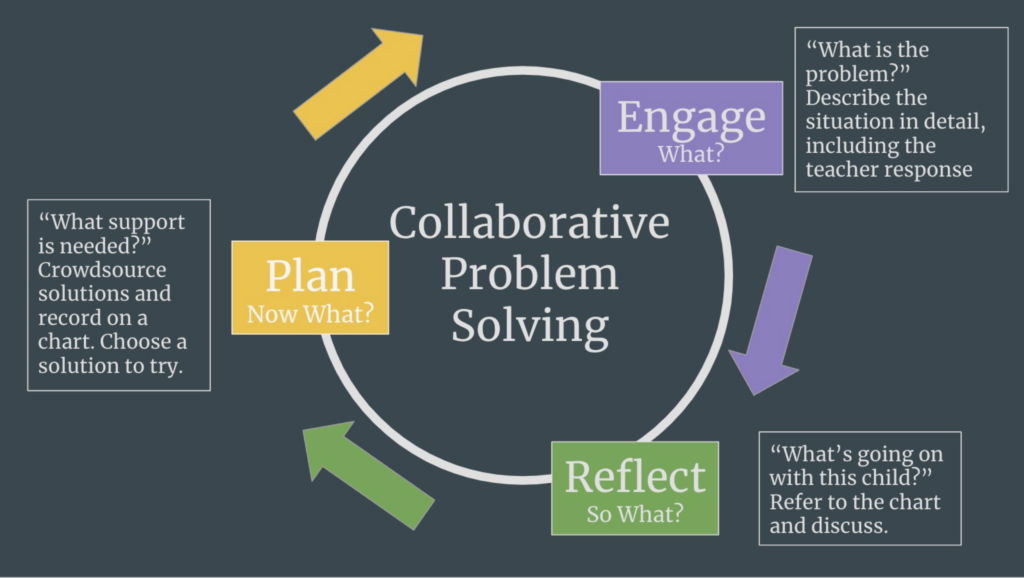
After modeling this process for everyone, teachers split into their mixed-division groups to practice the model. The value of this collaborative approach is vast, as it’s an opportunity for teachers to gain new perspectives and insight, helping create a shift in paradigm and introducing new ways of responding to student needs. It’s about connecting with colleagues and taking a child-centered approach, as much as it’s about reflecting on our own vulnerabilities and finding strength in the process. It is not about “fixing” a behavior, but opening ourselves to trying new approaches and embracing the spirit of the child.
During our October 6 teacher workday, our group of reflective practitioners reunited to share how our new system of collaborative problem solving is helping them in the classroom. Mixed-division groups reported out on strategy successes and areas of growth. More teachers had the opportunity to share a new challenge with their groups and seek strategies to try. Faculty feedback for this process has been overwhelmingly positive, and we are excited to be working closely together to authentically support students and to address their most critical needs.
Teachers spent the latter half of the workday looking at the scope and sequence of their Montessori curriculum, evaluating it with a fine-toothed comb to ensure fidelity and best-practice in every classroom. This “big work” is just one more way we are reflecting on our practice and ensuring that every student at GMS is engaged in meaningful work as they progress from Toddler through Junior High.
Through intentional planning, we make professional development at GMS relevant and meaningful. We consistently follow-up with faculty to ensure we are meeting their needs and supporting their professional growth. From workshops, trainings, and conferences to observations at other schools, professional development offers inspiration and connection for GMS teachers.
Greensboro Montessori School partners with Scholastic Book Fairs every fall and spring. All students in Primary and older have an opportunity to visit the Book Fair and purchase books during the school day. We prefer students do not bring cash to school. Instead, Scholastic Book Fairs has an eWallet payment option. Simply set up an account and have funds immediately available for your child to purchase books.
Set Up Your Child's eWallet
Follow these steps to set up your child's eWallet:
- Visit our Scholastic Book Fair homepage.
- Scroll to the "eWallet" section of the page, and click "Get Started."
- Review how it works, and click "Get Started" once again.
- "Sign in" or "Register" with Scholastic Book Fairs. Note, if you have previously created an account, please use the same login information.
- Complete the form to set up an eWallet. Follow the prompts to fund your child's eWallet. (Note, after creating one eWallet, you may add others for additional children. Click "Manage My Funds" to visit the eWallet tab. Click the arrow in the bottom right to show your first child's full account, and click "+ Add eWallet.")
- If you have funds that your child(ren) did not use during a previous Book Fair, you will see an option to fund your eWallet with a "gift card." This "gift card" holds the balance from the last fair, and clicking that option will transfer the balance to your child's current eWallet.
- If you had a balance on multiple eWallets, the balances have been combined on this one "gift card," which will transfer to the new eWallet you create.
- Once complete, you may print a paper voucher for your child to bring to school, or we can look up your child's eWallet by their name.
Come to Our Book Fair
We look forward to welcoming students, parents, and family members at the following community shopping times.
- Tuesday, April 23: 9 a.m. to 3 p.m.
- Wednesday, April 24: 9 a.m. to 5:30 p.m.
- Thursday, April 25: 9 a.m. to 5:30 p.m.
- Friday, April 26: 9 a.m. to 3 p.m.
If you are interested in volunteering at the Book Fair, please click here to sign up.
If you have any questions about the Book Fair, please don't hesitate to contact us.

